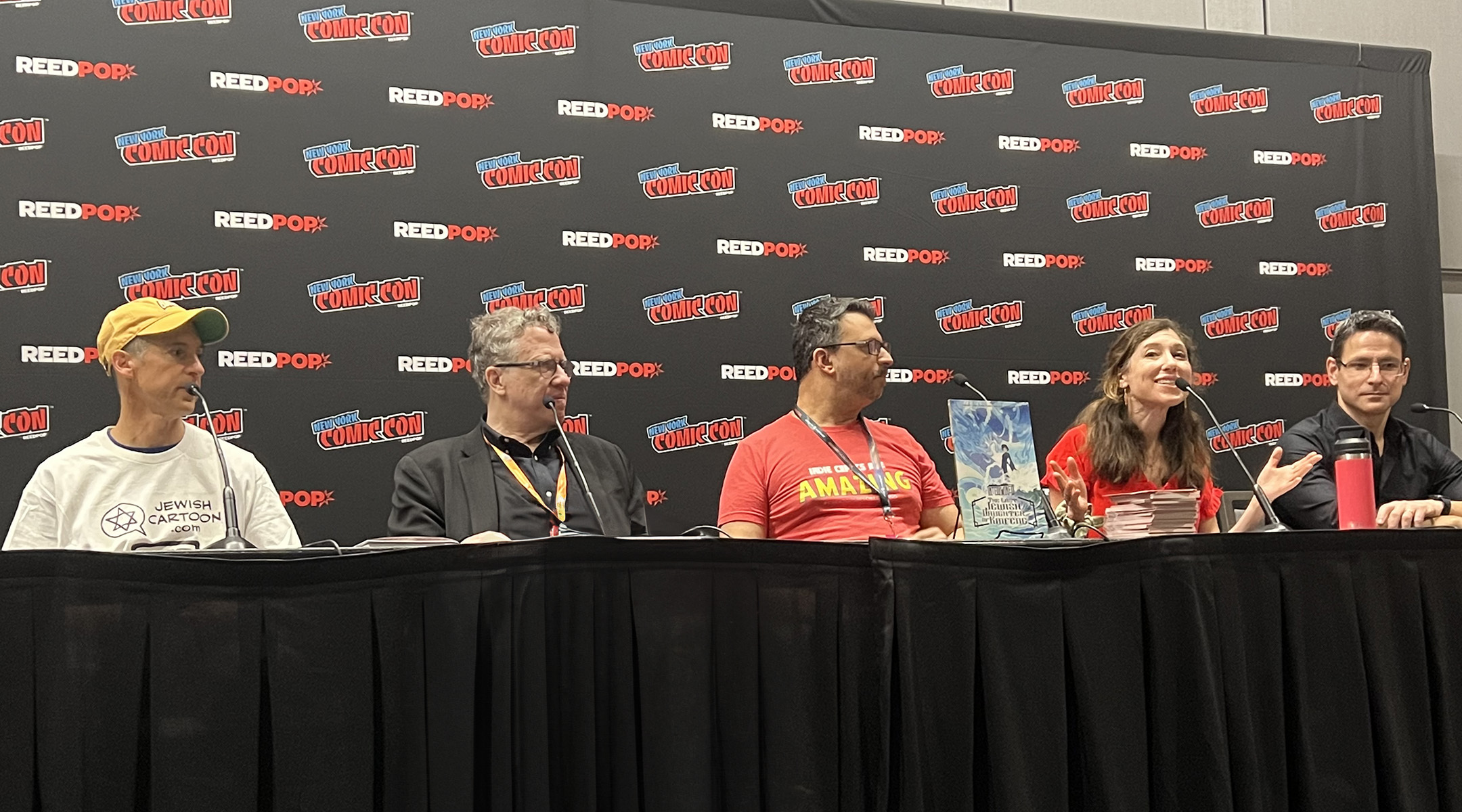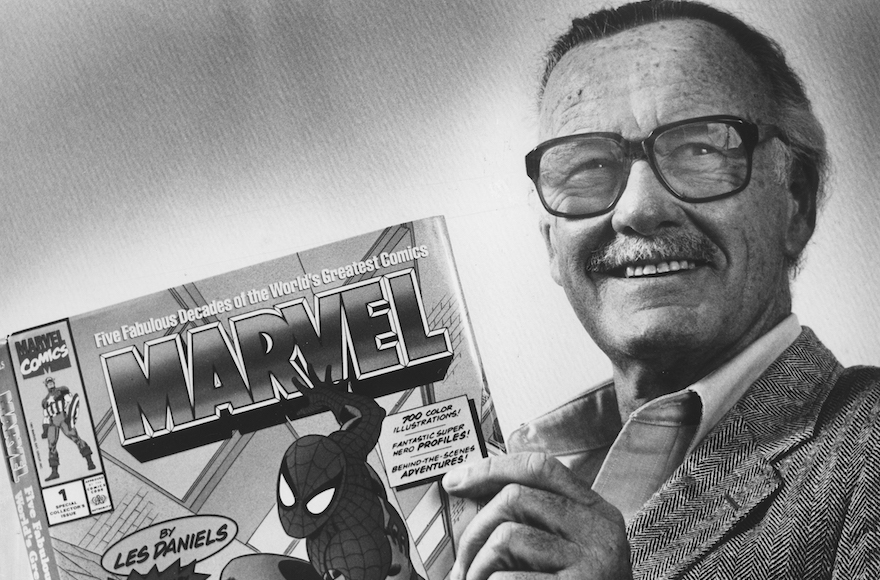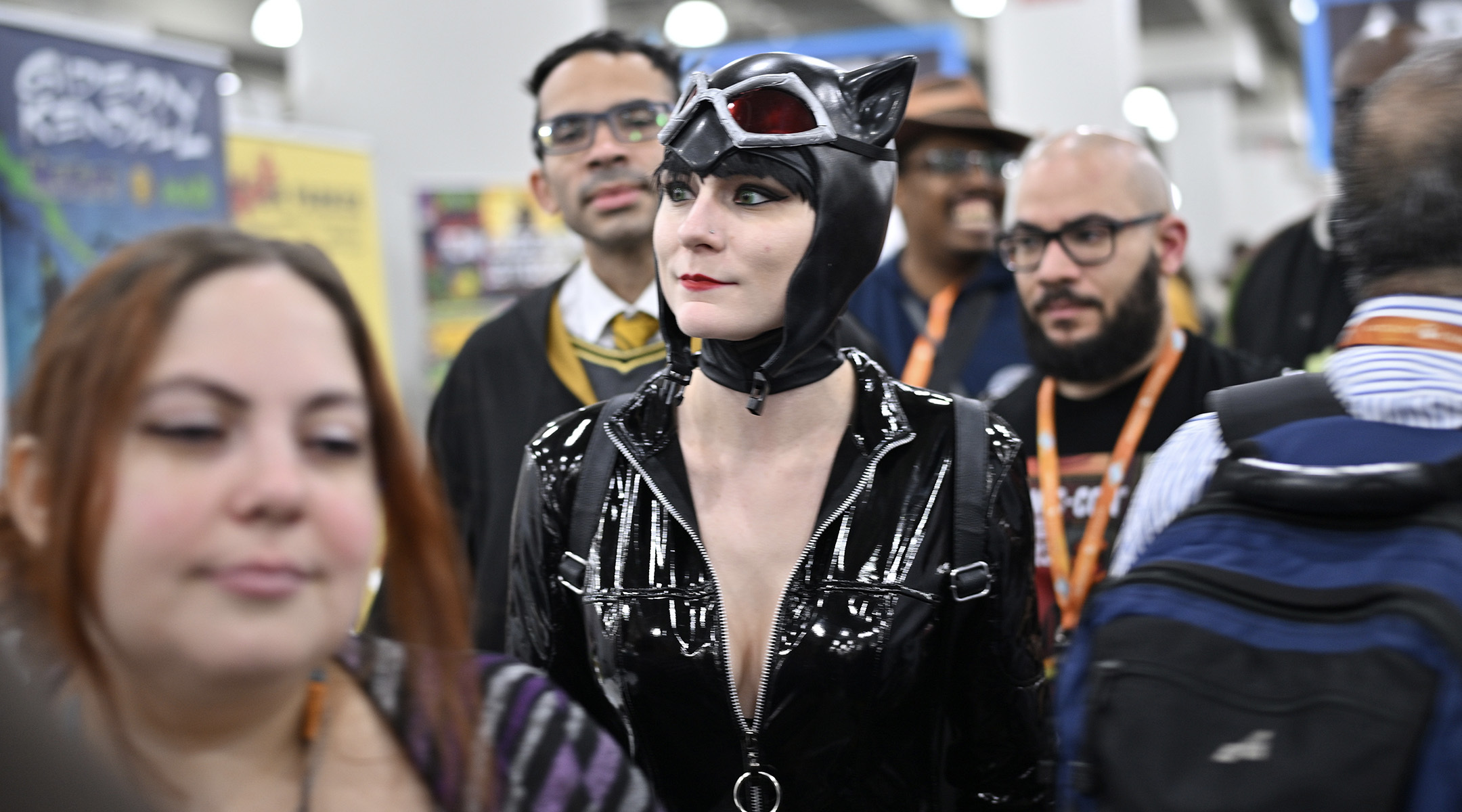(New York Jewish Week) — A panel on Jewish themes at this year’s New York Comic Con was planned and scheduled well ahead of Hamas’ surprise attack on Israel last Saturday, but its convenor said the traumatic week since made it more important than ever to highlight Jewish joy.
“This is a tough moment to be discussing this, but there’s this moment, this tough space between horror and atrocity and humor and incorporation of memory … that can coexist with joy,” said Miriam Eve Mora, the director of academic and public programs at Manhattan’s Center for Jewish History, who organized Thursday’s panel on “Jewish Identity in Comics Outside the Holocaust.”
“If you focus exclusively on trauma,” she said, “then you miss out on so much Jewish life.”
New York Comic Con, which began Thursday and runs through Sunday, draws thousands of lovers of comic books — and the movies and television shows based on them.
Amid appearances at the Javits Center by celebrities like Ewan McGregor and Chris Evans, there are panel discussions on myriad topics.
For Mora’s panel, some 200 fans heard Jewish authors’ varying views on what makes a Jewish comic. The panel featured Jewish comic creators Alisa Kwitney, Danny Fingeroth, Fabrice Sapolsky, Jordan Gorfinkel and Roy Schwartz.
Jews largely built the comic books business: In the early 20th century, with most publishing and advertising houses reluctant to hire Jews, many found themselves working in the upstart comics industry. In the late 1930s, writer Jerry Siegel and artist Joe Shuster, creators of Superman, were among the Jews who ushered in what’s known as the “Golden Age” of comics, and many Jewish-created superheroes followed.
Ahead of Thursday’s event, Mora told New York Jewish Week she wanted to give a more secular audience exposure to this history, and to highlight Jewish comics that were not about the Holocaust. Focusing on the Holocaust, she said, has become a “shorthand” for authors trying to make Jewish characters and storylines.
“I think the goal should be that people who are and are not Jewish, who are creators, can more accurately and casually and freely include Jewish characters from diverse backgrounds,” said Mora, who is the co-creator of the Jewish Comics Experience, a current exhibit at CJH. “We cannot be defined by one type of Jew or one image of Jew, because Jews are a tremendous multiverse in and of itself.”
Mora’s panel is the only one of the four-day convention about Judaism. Last year’s New York Comic Con had no panels dedicated to Jewish topics, though at least two — including a panel that had run successfully in previous years — were rejected.
It is not known whether the inclusion of “Jewish Identity in Comics Outside the Holocaust” in this year’s lineup was a response to last year’s outcry from Jewish fans. Representatives from New York Comic Con did not respond to multiple requests for comment.

At New York Comic Con, Jewish comic creators, from left, Jordan Gorfinkel, Danny Fingeroth, Fabrice Sapolsky, Alisa Kwitney and Roy Schwartz, discuss “Jewish Identity in Comics Outside the Holocaust” on Oct. 12, 2023.(Elizabeth Karpen)
During the panel discussion, comics creator and publisher Sapolsky said that, as a child growing up in Paris, he noticed that many of the authors of his favorite comics had Jewish last names.
“For me, all American comics were Jewish,” said Sapolsky, who is co-creator with Mora of “JewCE!”, a comics convention being held next month at the Center for Jewish History “promoting diverse Jewish narratives in comics.”
For Fingeroth, who is best known for his work editing the Spider-Man comics and his biography of Stan Lee, perhaps the best known Jewish comics creator, a Jewish comic can’t be easily defined. “It’s like pornography,” he joked. “I don’t have a definition, but I know it when I see it.”
Gorfinkel, known for editing the Batman comics franchise and creating the “Passover Haggadah Graphic Novel,” added that, in addition to creating Jewish characters, Jewish comic creators have a responsibility to infuse their work with tikkun olam — the Jewish tenet to repair the world. “A comic’s got to make the world a better place because Judaism is about being a light unto the nations,” he said. “My feeling is, if we have the honor to be able to share our work with multitudes, then we also have a responsibility to put in some kind of ethics or morals.”
Schwartz, the author of “Is Superman Circumcised? The Complete Jewish History of the World’s Greatest Hero,” pushed forward what he calls his “Jewish Bechdel test”: To be considered a “Jewish comic,” a comic must meet two of three criteria — be written by a Jew, have Jewish themes and include Jewish characters.
He added that, recently, he’s noticed that Jewish comic book authors are creating more explicitly Jewish characters. “They’re comfortable in their own skin,” Schwartz said. “And they don’t feel the urge, the necessity, to put on a secret identity on top of that.”
Today, said Mora, there are more comics than ever telling diverse Jewish stories, noting that many of them come from independent publishing houses and outside the superhero genre.
Sapolsky, for example, recently released “Intertwined: The Last Jewish Daughter of Kaifeng,” which centers on the experiences of a Chinese Jewish woman. Sapolsky’s FairSquare Comics, an independent publisher that aims to promote diversity, will soon release “Hyphen,” a slice-of-life collection including the stories of Jews of color, transgender Jews and other diverse Jewish populations.
Mora underscored the importance of these new comics that portray Jews from across the world, of all races and ethnicities, who practice their Judaism differently. “The more of these that break into the mainstream, the less readers are going to think they know what a Jew looks like,” she said. “And that’s so important for accurate representation.”

Stan Lee, shown in 1991, was perhaps the best known of the Jewish writers and artists who helped create the comic book industry. (Gerald Martineau/The Washington Post via Getty Images)
Schwartz, who was born and raised in Israel, hoped there will eventually be a positive Israeli comic book character that could be “accepted by everybody” — a remark that drew cheers from the audience.
Mora had told the crowd that the panelists had decided not to discuss the events of the Middle East during the hour-long session. Still, Hamas’ recent attack on Israel hung over the crowd.
Sam, who declined to give her last name, said she was drawn to the Jewish identity panel in light of the recent violence in Israel, which is now reverberating around the world. She told New York Jewish Week that she wanted to learn more about Jewish comics and how to support Jewish creators because she has Jewish ancestry, but isn’t involved in the Jewish community.
“I feel like I don’t know enough about Jewish culture,” Sam said. “I usually go to a diversity in comics panel and this seemed right to go to this year.”
During the panel, Kwitney, an author of Jewish romance comics and a former editor at DC Comics, said she feels that comics have not properly addressed the issues facing young American Jews — particularly rising antisemitism. “What’s missing is some of what is challenging about being Jewish today,” she said. “I think about the dilemma that a lot of young people are facing on college campuses. To have a character who’s Jewish and in their 20s and not have them face any of the dilemmas where there is anti-Zionism and antisemitism, that’s hard to grapple with.”
Alyssa, an audience member who declined to give her last name, told New York Jewish Week that the panel bridged the gap between her love of comics and her Jewish identity. “Comics have a Jewish origin, but the stories always felt very Christian-centric,” she said. “It’s exciting to see more comics for Jews, written by Jews.”
Gorfinkel, who is an observant Jew, said that he’s always associated Jewish joy with comic books. As a kid, he would stock up on comics to read on Shabbat; it was the highlight of his week. He loved reading comics under the table while his family prayed and he believes that he learned his Jewish values from them.
“I actually learned morality from DC Comics, where the heroes were good and the villains were evil and we always vanquished evil,” he said. “I didn’t learn it from the Bible, I learned it from superheroes. But, hey, superheroes are based on the Bible, so I guess in a way it comes full circle.”
Gorfinkel is currently working on a graphic adaptation of the Torah, the five books of the Hebrew Bible. “I’m using the storytelling that Jewish people from the 1930s and 1940s established and carry through to today to bring out what’s incredible about Judaism and the Jewish faith,” he said. “We make Judaism our superpower.”
The New York Jewish Week brings you the stories behind the headlines, keeping you connected to Jewish life in New York. Help sustain the reporting you trust by donating today.





